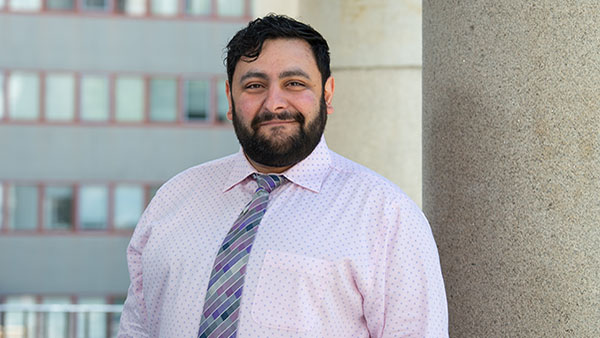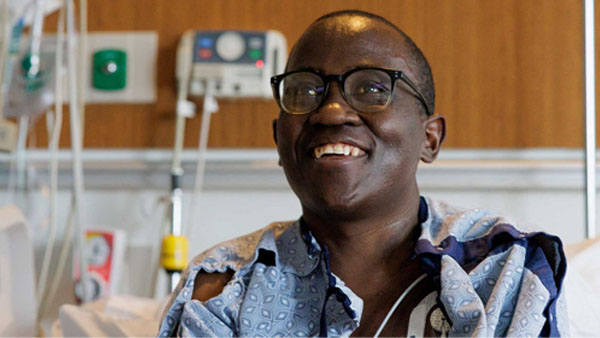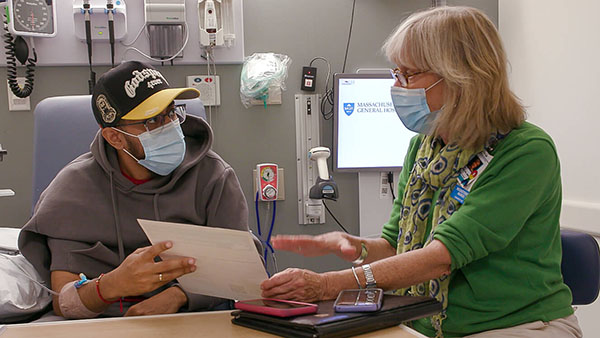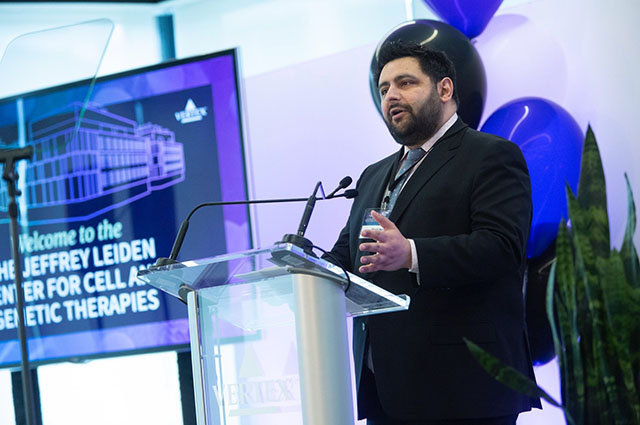Comprehensive Sickle Cell Disease Treatment Center


Contact Information
Comprehensive Sickle Cell Disease Treatment Center
Mass General Hospital
55 Fruit Street
Boston,
MA
02114
Phone: 617-643-9042
To make an appointment, or if you have any questions, please call us at 617-643-9042.
Support Us
Your gift to the Comprehensive Sickle Cell Disease Treatment Center helps us to provide patients and their families with a multidisciplinary team of experts who are passionate about providing the best possible care from childhood to adulthood. Make a gift.
Explore the Comprehensive Sickle Cell Disease Treatment Center
Overview
Sickle cell disease (SCD) touches so many aspects of life both in and out of the hospital. Our approach is to create a true medical home where patients and their families can feel seen and heard. We understand the complexities of the disease and our comprehensive team has the experience to care for you and your family. We are deeply committed to you and want to advocate for you within the healthcare system. We have the abundant resources of a general hospital to care for you and to help you manage your disease and its symptoms.

Our team is adept at the management of adults with sickle cell disease and are readily available to help you transition from pediatric to adult care. You are the most important member of the medical team and you’ll be joined by our group of experts to develop and coordinate a comprehensive treatment plan for you.
What Is Sickle Cell Disease?
Sickle cell disease is an inherited, life-threatening blood disorder, affecting approximately 100,000 Americans. In the United States alone, 4,000-5,000 pregnancies annually result in some variant of sickle cell disease. The disease is most commonly seen in the black and brown population where the gene frequency for sickle hemoglobin (HbS) is 4%. As a result of newborn screening, immunizations, treatment of infections, disease modifying agents like hydroxyurea, and improved supportive care, the survivability has markedly improved over the last ten years.

The greatest impact on the management of sickle cell disease comes from the establishment of a multidisciplinary care team that can meet patients where they are and provide them with the resources needed to live healthy lives. With new therapies on the horizon, we have good reason to be hopeful about the future.
Innovative Treatment Options
Our Center has created a unique model where our patients are seen jointly by both hematologists with specialized expertise and primary care providers because we know that sickle cell disease touches all aspects of health. We are equipped with the latest disease modifying agents for sickle cell disease including voxelotor, L-Glutamine, and crizanlizumab. We have partnered with our colleagues in stem cell therapy to provide expertise in stem cell transplant. We strive to bring the latest medical treatments and clinical trials to our Center so that our patients can have access to the most innovative approach to treating their disease.
In addition to medical therapies, all of our patients have access to integrative modalities including acupuncture, massage therapy, yoga, and medication. We have a dedicated sickle cell disease chaplain for spiritual care and if you need to be admitted to the hospital, our unique partnership with palliative care allows us to holistically treat your pain and symptoms.
The Mass General Difference

Sickle cell disease is best managed through a care model that integrates multiple disciplines to help patients tackle the many facets of an illness that spans a lifetime. Attention to the physical, psychosocial, and financial impacts of the disease are key to providing good care for patients and their families. At Mass General, we have the abundant resources to care for you and to help you manage your disease and its symptoms.

National Alliance of Sickle Cell Centers
The Mass General Comprehensive Sickle Cell Disease Treatment Center is proud to be a member of the National Alliance of Sickle Cell Centers (NASCC). NASCC is committed to providing support, education, and other resources to sickle cell centers across America in order to enhance the quality of patient care and improve outcomes for patients and the centers alike.
CRISPR Gene Therapy for Sickle Cell Disease
In December 2023, the Food and Drug Administration (FDA) approved a transformative gene editing therapy for sickle cell disease. The gene editing treatment, called exa-cel or Casgevy, uses a CRISPR-based therapy, a gene editing tool that precisely targets and modifies the specific gene associated with fetal hemoglobin.
Fetal hemoglobin is the protein that red blood cells use to transport oxygen throughout the body during infancy. Following birth, the body transitions to producing adult hemoglobin. However, for patients with sickle cell disease, this is the time when the body starts producing sickle hemoglobin instead of the usual adult hemoglobin. In clinical trials, the fetal hemoglobin was reactivated by Casgevy, which was found to reduce the frequency of painful vasoocclusive crises associated with sickle cell disease, improving the quality of life for patients who received the treatment.
Casgevy is the first approved technique for treating a genetic disease through CRISPR gene-editing. Mass General is one of the first nine hospitals in the United States that is authorized to administer it to qualifying patients with sickle cell disease.
To extend the availability of this treatment to more patients in the future, Mass General's Comprehensive Sickle Cell Disease Treatment Center is actively:
- Addressing key challenges, including arranging accommodations for patients traveling longer distances, addressing fertility preservation, and focusing on survivorship initiatives.
- Advocating for the Massachusetts State Legislature to pass legislation co-authored by MGH clinicians. This legislation aims to directly address the disparities associated with the administration of gene therapy and improve the quality of care for all patients living with sickle cell disease in the commonwealth and their families.
This cutting-edge intervention marks the beginning of a new effort to improve sickle cell disease treatment. The Mass General Comprehensive Sickle Cell Disease Treatment Center is actively contributing to spearhead this effort, ensuring that patients and their needs remain central to the advancements.
FAQs About CRISPR Gene Therapy for Sickle Cell Disease
What is CRISPR?
CRISPR, which stands for Clustered Regularly Interspaced Short Palindromic Repeats, is a revolutionary gene-editing technology. CRISPR technology was designed based on the natural defense mechanisms found in bacteria.
In the context of gene editing, scientists use CRISPR to precisely target a specific DNA sequence and make changes to the genetic code. In health care, it is being leveraged to treat genetic disorders and to conduct research to understand how genes work. The efficiency, accuracy, and versatility of CRISPR in comparison to other genome editing tools have made it an exciting development in genetic engineering and molecular biology.
What is the process to undergo CRISPR gene therapy for sickle cell disease?
CRISPR gene therapy is a novel, cutting-edge therapy for sickle cell disease. The gene editing treatment, called exa-cel or Casgevy, uses a CRISPR-based therapy, a gene editing tool that precisely targets and modifies the specific gene associated with fetal hemoglobin.
Sickle cell disease is a hereditary blood disorder characterized by a genetic mutation that transforms typically round-shaped red blood cells into crescent shapes. This causes them to become trapped in blood vessels and restrict blood flow. Editing a patient’s genes via CRISPR technology has been proven effective in activating a protein called fetal hemoglobin, which helps red blood cells keep a healthy round shape.
At Mass General, patients undergoing CRISPR gene editing therapy for sickle cell disease will first have their bone marrow stem cells extracted. To gather the cells, doctors will give the patient a medication that causes the marrow to be released into the blood. These cells are then treated (edited) in a lab using CRISPR-gene therapy technology to enable the production of healthy blood cells as soon as they are infused back into the body. The CRISPR-edited cells are tested for quality and safety before being infused into the patient.
Before the procedure, the doctor will administer chemotherapy to ensure the bone marrow is ready to receive the newly modified cells. During this time, patients should expect to stay in the hospital for approximately one month for monitoring, as the repopulation of the cells into the marrow impairs the immune system.
How long has CRISPR gene therapy been used for sickle cell disease at Mass General?
Massachusetts General Hospital's Comprehensive Sickle Cell Disease Treatment Center became an authorized treatment center for exa-cel shortly after its approval by the FDA in December 2023. In fact, it is only one of a few in the country that is approved to administer this one-of-a-kind treatment.
Why do only a few hospitals offer it?
There are a few challenges to making CRISPR gene therapy available for treating sickle cell disease. First, it's a complex process that demands a lot of resources, making it difficult for many hospitals to treat a large number of patients even if they have the approval. Additionally, before the treatment begins, a patient’s insurance needs to agree to cover the costs. Getting this approval can take several months.
Is CRISPR gene therapy a cure for sickle cell disease?
It is not a cure. CRISPR gene therapy is a first-of-its-kind transformative therapy that is shown to reduce the rate of painful crises in sickle cell disease. The quality of life of the patients who participated in the clinical trials was greatly improved as a result of this intervention.
What are the potential risks or side effects associated with CRISPR gene therapy?
The primary risks associated with gene therapy are linked to the specific chemotherapy required before the bone marrow transplant, which has been shown to result in infertility and temporary hair loss for the majority of patients who receive it. We can offer options for fertility preservation for individuals undergoing gene therapy who hope to start a family. It's important to note that, currently, insurance does not cover this aspect of care. Our team is actively engaged in efforts within Massachusetts to address this through legislative initiatives and securing grants to assist patients with the associated costs.
Family planning is an important consideration for patients also contemplating gene therapy. Our team is ready to have those conversations with you, ensuring that you have the information needed to make the right choice for both you and your family. We are here to support you throughout those decisions.
How can I learn more about gene therapy and what role it might play in my treatment?
Mass General's Comprehensive Sickle Cell Disease Treatment Center provides a compassionate, patient-centric approach to gene therapy. We are excited about the potential impact this transformative treatment on the lives of individuals with sickle cell disease, particularly given the historically limited treatment options available.
If you have any questions about the CRISPR gene therapy for sickle cell disease, please call us at 617-643-9042. Our expert team is here and ready to have an open and comprehensive discussion with you about the benefits and risks. We are committed to being with you every step of the way throughout your treatment journey.
Meet the Team
Sickle cell disease can impact many aspects of your health, and we provide patients and their families with a multidisciplinary team of experts who are passionate about providing the best possible care from childhood to adulthood, including a dedicated social worker, a dedicated nurse navigator, infusion space for treatments, the latest treatments, and access to community resources.
Sharl Azar, MD
"We know that sickle cell can touch so many aspects of your life and we want the resources that you need to be only a phone call away. We want to be your advocates. We want to be here for you and your family."

Ellen Silvius, RN
Ellen Silvius is the dedicated Nurse Navigator for the Comprehensive Sickle Cell Disease Treatment Center, and she is the primary point of contact for all of our patients.

Sharon Amos, RN
Sharon takes great pride in her role as a Nurse Navigator for the Sickle Cell program, and is honored to serve as advocate, caregiver and ally to her patients.

Kate Quint, LICSW
Kate is the dedicated social worker for the Sickle Cell Disease program. She enjoys being an advocate to her patients, a trusted support, and an empathetic ear.

Patient Stories
Allan Byamukama
Two years ago, Allan became a patient at the Comprehensive Sickle Cell Disease Treatment Center. Recently, he became one of the first 15 people in the world to receive a cutting-edge therapy for SCD. While it's not a cure, it has significantly eased his symptoms—and turned his life around.

John Baez
John Baez does not know a life free of sickle cell disease, and he may never will. But with the help of Mass General’s comprehensive care team, he’s living one that’s full of hope, determination and social activism.

Patient Resources
Sickle Cell Disease
Learn more about Sickle Cell Disease in this special issue of the Bay State Banner.
Greater Boston Sickle Cell Disease Assoc.
Dedicated to advocating for & providing support services to patients and families.
oneSCDvoice
We connect, educate, and empower the sickle cell disease community of care.
New England Pediatric Sickle Cell Consortium
A regional cooperative group of New England Pediatric Hematology programs devoted to SCD.
Mass General for Children
Learn about the Pediatric Blood Disorders Program at Mass General.
Mass General Primary Care
Mass General provides comprehensive primary care and medical specialty services.
Mindfulness and Meditation for Sickle Cell Patients
View our series of mindfulness and meditation videos for sickle cell patients, led by Lisa Leung-Tat, yoga and meditation instructor.
Introduction: Lisa Leung-Tat, yoga and meditation instructor, defines mindfulness and meditation and describes how cultivating both can be helpful in times of stress as a tool for well-being for sickle cell patients.
Session 1: Lisa Leung-Tat provides a brief guided session giving sickle cell patients clear instructions for body-mind awareness using the breath as an anchor.
Session 2: Lisa Leung-Tat guides a meditation for sickle cell patients focused on further exploring practice by deepening the breath and using the rhythm of the breath to calm the mind.
Session 3: Lisa Leung-Tat leads a meditation for sickle cell patients and explains how silence and stillness in body and mind can create space in the mind which leads to clarity.
Session 4: Lisa Leung-Tat leads a meditation for sickle cell patients which focuses on deepening the breath practice. Using deep full breaths creates an anchor which leads to greater calm in the mind and relaxes the body.
Guided Meditation: This guided meditation with Lisa Leung-Tat offers a breath meditation and body scan to help relax tension in the body.
Building Bridges with the Greater Boston Community
In our effort to learn from and partner with the sickle cell disease community in Boston, we partner with the Greater Boston Sickle Cell Disease Association and the New England Sickle Cell Consortium. We work with our colleagues at other sickle cell programs throughout the commonwealth and transition pediatric patients from both Mass General for Children and Boston Children’s Hospital.
News
View news about the Comprehensive Sickle Cell Disease Treatment Center
The Making of a World-Class Sickle Cell Treatment Center
Sharl Azar, MD, was recruited to Mass General in 2020 to build a comprehensive, inclusive program to treat adult patients with sickle cell disease, and the Comprehensive Sickle Cell Disease Treatment Center was born. In the three years since, the Center has become a nationally recognized and highly sought-after service. Read more.
New Fitness and Nutrition Program

Mass General is proud to offer our SCD patients the opportunity to be a part of our innovative new fitness and nutrition program. Jen Miramontes, Personal Trainer and Medical Exercise Specialist, provides personalized fitness programs specific to our participating patients with SCD. With the launch of this new program, Mass General seeks to provide equitable and fair access to every aspect of health and wellness for our SCD patients.
Learn more about the fitness program as featured in ABC News.

Supporting Innovation for People With Sickle Cell Disease
With support from The Vertex Foundation, the Mass General Comprehensive Sickle Cell Disease Treatment Center will expand its innovative, multidisciplinary approach to treating a disease that historically has not received the attention it deserves. Read more about how The Vertex Foundation's gift will help the Center establish a dedicated athletic training program and a first-of-its-kind survivorship program.
Importance Of Black Blood Donors For Patients With Sickle Cell Disease
Dr. Sharl Azar, Director of the Comprehensive Sickle Cell Disease Treatment Center at Mass General Hospital, spoke with Dr. Mallika Marshall at WBZ Boston about the importance of getting blood donations from Black Americans. “When I think about my patients living with sickle cell disease, they are going to be needing blood transfusions repeatedly over the course of their lifetime. It is important for us to be able to match that blood to them as closely as possible,” said Dr. Azar. Watch the video from WBZ Boston here.

Bay State Banner: Be Healthy Winter 2022 Edition
Learn more about Sickle Cell Disease in this special issue of Be Healthy from the Bay State Banner. The issue features interviews with Mass General's Sharl Azar, MD and David Sykes, MD, PhD, and includes articles about living longer with sickle cell disease, transitioning to adult care, patient stories, recipes, and much more.
Ellen Silvius, RN awarded inaugural Department of Medicine Equity Award
Congratulations to Ellen Silvius, RN, nurse navigator for the Comprehensive Sickle Cell Disease Treatment Center, who was awarded an inaugural Department of Medicine (DOM) Equity Award. These awards recognize DOM members who have exemplified the Department's commitment to equity by going above and beyond to: combat bias or discrimination; respond to the social needs of patients or promote equity for patients or coworkers on the basis of race, ethnicity, sexual orientation, gender identity, age, disability, religion, or national origin.
Ellen is a tireless advocate for the patients she serves and goes above and beyond to help patients receive the care and resources they need. She has exemplified a passion for helping address the social needs of the patients she serves including helping patients navigate issues of transportation and food insecurity. Congrats, Ellen!
"I learned the most about medicine from my dad’s death"
In a powerful piece paying tribute to his father, Gleeson Rebello, MD, pediatric orthopaedic surgeon and Sickle Cell Disease Treatment Center team member, shares lessons that his father’s death taught him about the medical field and how personal loss has made him a more thoughtful physician. Read his story.
A Top Hospital in America
Mass General is recognized as a top hospital on the U.S. News Best Hospitals Honor Roll for 2025-2026.
Our Commitment to Equity & Inclusion
Mass General is developing innovative strategies across our mission to measurably improve equity and inclusion.
Comprehensive Sickle Cell Disease Treatment Center
Our approach is to create a true medical home where patients and their families can feel seen and heard. We understand the complexities of the disease and our comprehensive team has the experience to care for you and your family.
